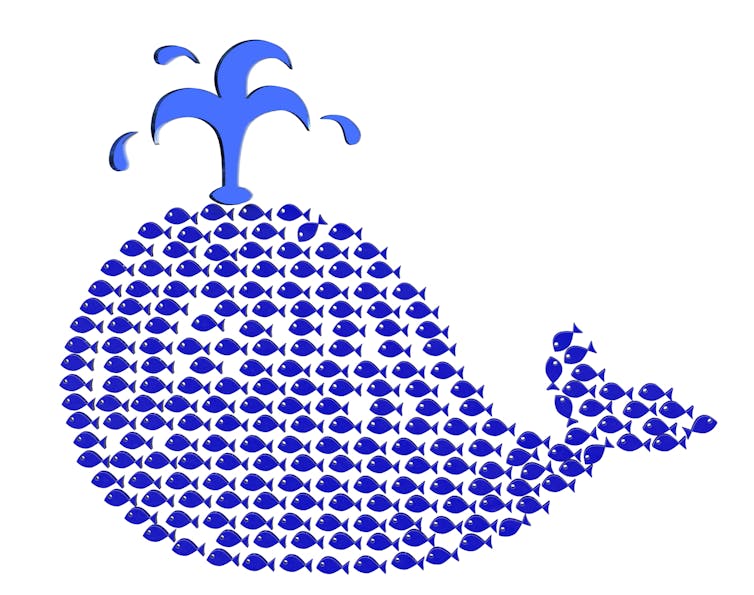The video games industry is worth more than movies and music combined, with more than 2.5 billion players around the world. Freemium games have driven much of the success, ever since titles like Angry Birds, Farmville and Candy Crush emerged in the late 2000s and early 2010s.
Many of us will be familiar with the freemium business model: free but restricted access to games that are often simple, or “casual” as they are sometimes known. A minority of players pay for things like speeding up their progression, altering a character’s appearance or often just to remove adverts; while the majority just play for free.
Titles like Pokémon GO, Fortnite and Apex Legends have all been huge freemium successes in recent years, monetising their player base to an impressive scale. Freemium and advertising-funded games reportedly generated US$88 billion (£67 billion) of the whole gaming industry’s US$110 billion in 2018, with more than half coming from Asia.
‘Gotta catch 'em all.’ dennizn
Yet for every legendary success in this market, many others disappear without trace. Players often move on to new games quickly, perhaps due to these games’ simplicity; or perhaps because they feel little commitment from never having paid in the first place. Freemium games usually need to make their money fast: the average title generates 75% of revenues in its first three days.
Developers design games to keep people playing for as long as possible, and to maximise the numbers who switch from playing for free – “conversion rates” in the industry jargon. This has contributed to fears that games are addictive, leading experts to coin the phrase “gaming disorder”. The UK has just opened its first clinic for children with gaming addictions, for instance.
Freemium games have a sufficiently bad name that some commentators are eagerly anticipating their demise at the hands of Apple Arcade and Google Stadia, new Netflix-style subscription services where you can play premium games without a console. Unquestionably these services are a new challenge for freemium games. One possible response is for more developers to move away from the quick-buck approach towards creating games to attract communities for the long term. This has been the subject of our research – and it has produced some unexpected results.
Danish dice
We researched a games community in Denmark devoted to traditional card and dice games that had kept tens of thousands of players active for over a decade. Almost all players were playing for free, while a minority paid for additional features like VIP access to enable them to organise tournaments, among other things. Originally owned by a Danish television channel, the platform had been acquired by an online software developer that wanted to make more money from the community, for instance with games where people paid to play for cash prizes.
We interviewed gamers in the community and found a clear distinction between “social players” and “achievers”. Social players were mainly interested in maintaining friendships and friendly rivalries within the community. The achievers were more interested in competition and gaining recognition. Other researchers have made a similar distinction in this area. In general, social players may pay for certain services within a freemium game, but less so than achievers.
In our Danish gaming community, social players would often use the platform to discuss things happening to them in the real world, and would even meet up offline for events where they would wear badges with their in-game names. They didn’t like attempts by the new owner to monetise their participation.
Achievers contributed less to the social environment, but still valued the community, since they saw their achievement as more meaningful when it felt like they were defeating real people, or reaching the top of a more competitive leader board. They played more, and were even motivated to pay more, when they felt a strong connection with the player community.
Unfortunately, the platform owner did not recognise this distinction between different types of players. It tried to make more money from everyone, and when it was clear that many players were not willing, it closed the platform down. Had the owner sought instead to only make more money from the achievers, and recognised the value of the free players in facilitating this, the platform would probably have remained viable.
Lessons to learn
Unlike business models that rely on every customer paying a small amount, freemium game revenues usually come from a fraction of players. Players can be divided into whales, dolphins and minnows. Whales usually represent less than 10% of players, but contribute more than 50% of revenue. Minnows make up more than 50% of players, but spend little or nothing, while dolphins sit somewhere in between.
While it is natural for a business to focus on the whales, our conclusion is that minnows and dolphins can make an equally important contribution. You will probably attract more whales and keep them engaged for longer if you aim to maximise your dolphins and minnows. They’re often the social players who will make others feel welcome, while performing other useful roles like moderating chatrooms to monitor troublemakers.
Fish-mash. dandesign86
Though we were looking at a freemium game designed for the long term, these insights may be transferable to games with a shorter turnaround. At the very least, if developers avoid annoying free players by trying too hard to convert them into paying players, it might help build the critical mass to make the game more attractive to achievers.
The task for a freemium games provider should be to recognise and reward the efforts of non-monetary contributors, while identifying those “achievers” who benefit and are also willing to pay. That could be the route to generating revenues year after year, building a freemium model that will be sustainable when all those “quick-buck” games have become ancient history.



 Oscars 2025: who will likely win, who should win, and who barely deserves to be there
Oscars 2025: who will likely win, who should win, and who barely deserves to be there  Paramount’s $108.4B Hostile Bid for Warner Bros Discovery Signals Major Shift in Hollywood
Paramount’s $108.4B Hostile Bid for Warner Bros Discovery Signals Major Shift in Hollywood  Paramount Skydance Eyes Streamlined Merger with Warner Bros Discovery Amid $60 Billion Offer Rejection
Paramount Skydance Eyes Streamlined Merger with Warner Bros Discovery Amid $60 Billion Offer Rejection  FxWirePro- Major Crypto levels and bias summary
FxWirePro- Major Crypto levels and bias summary  George Clooney Criticizes Trump’s Tariff Threat, Calls for Film Tax Incentives
George Clooney Criticizes Trump’s Tariff Threat, Calls for Film Tax Incentives  Trump Threatens Legal Action Against Disney’s ABC Over Jimmy Kimmel’s Return
Trump Threatens Legal Action Against Disney’s ABC Over Jimmy Kimmel’s Return  Trump-Inspired Cantonese Opera Brings Laughter and Political Satire to Hong Kong
Trump-Inspired Cantonese Opera Brings Laughter and Political Satire to Hong Kong 




































